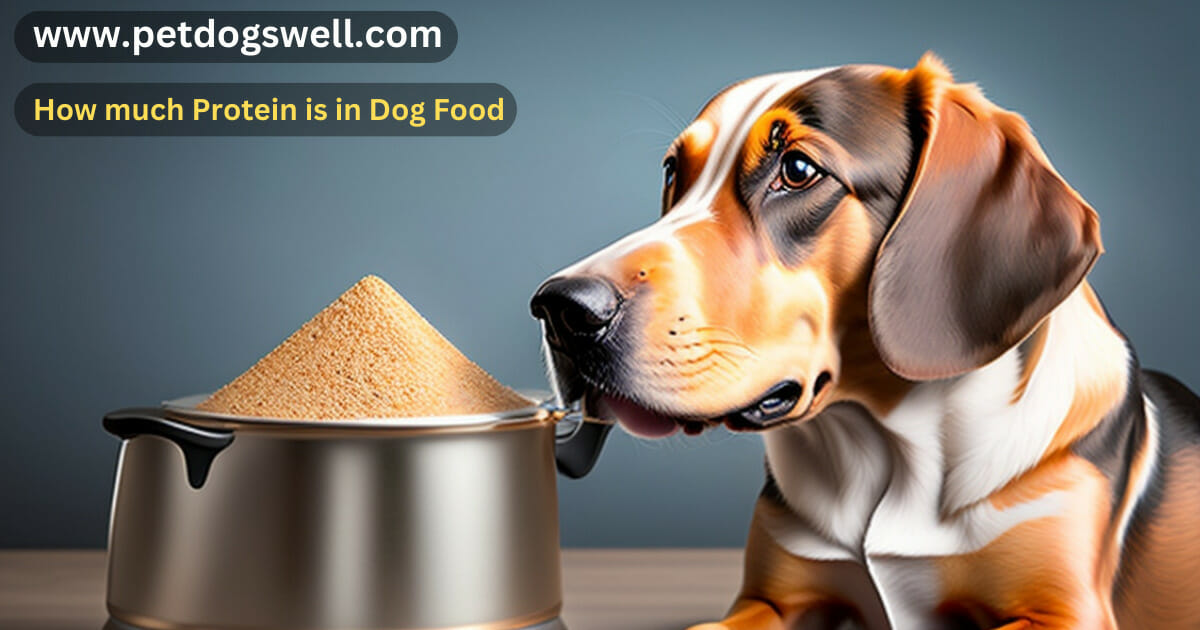How much protein is in dog food | How much protein should a dog have daily
Protein is one of the most important nutrient elements for dog food as it plays a major role in maintaining their overall health and well-being. Same like humans, dogs also require a good amount of protein in their daily diet for the best and healthy performance of different body functions.

All about Dog Food: How Much Protein is in Dog Food?
Protein-based dog foods are very healthy and help a lot in initial growth and keep your dogs energetic and very active. These healthy foods save dogs from many health disorders like reducing weight in obese dogs and controlling cholesterol to maintain blood pressure at normal levels.
In this article, we will thoroughly explain how much protein is in dog food, common protein sources, protein level recommendations, and how to choose the right and healthy food for your dog.
1. Protein as Dog Food
Protein plays an important role in all living things, especially human beings and animals. It acts as the building blocks of muscles, tissues, enzymes, hormones, and antibodies in all humans and animals like dogs.
Protein provides the essential amino acids that mainly contribute to the general growth, development, and maintenance of the bodies of dogs. If dogs do not consume enough protein, they may suffer from weak and poor immune systems, weakness of muscles, and many other health disorders.
2. Importance of Protein in Dog Food
Protein in dog food is very important because it provides energy to the body, essential amino acids for many cellular functions, and repairing and building body tissues in your dogs.
Protein also helps maintain healthy skin, coats, and nails, as well as cellular and organ functions in dogs. Additionally, protein is very essential as it produces enzymes and hormones that regulate different biological processes in dogs.
3. Common Protein Sources in Dog Food
Dog food manufacturers use many different types of protein (animal & plant-based proteins) in their dog food products.
Animal Proteins for Dog Food
The most common animal protein sources used in dog food are eggs, chicken, lamb, beef, fish, and turkey. These animal-based proteins provide a complete amino acid profile that is necessary for dogs’ health and overall well-being.
Plant-based Proteins for Dog Food
In addition to animal proteins, some dog foods also include plant-based protein sources like beans, peas, lentils, soy and quinoa. These plant proteins also provide healthy nutrients and many health benefits in dogs, like soy and pea proteins maintain firmness more effectively as compared to meat.
According to their own characteristics and nature, each protein source provides enough energy and required amino acids for healthy growth and overall well-being of your dog.
4. Recommended Protein Levels for Dogs
The recommendations for protein feeding to dogs are different depending upon multiple factors, including their age, size, breed, activity level, and overall health.
The most active dogs and those who perform heavy exercises and physical activities need more protein-rich food as compared to those who are lazy and don’t perform high-power activities.
Generally, adult dogs need a minimum of 18-25% protein in their diet, while on the other side puppies, pregnant or lactating dogs, and highly active dogs may need higher protein levels. Protein is a very healthy and energetic food for dogs and it provides much energy to your dogs.
5. Protein Requirements for Different Life Stages
Dogs have different protein requirements at different stages of life. Newborns and puppies need higher protein levels to support their rapid growth and development. Because at early growth stages, dogs need more energy and a healthy diet to be grown and remain healthy.
After that, dogs grow and become young, at this stage of life they may involve in different powerful activities like hunting, jumping and exercising, so they also need more amount of protein in their diet.
In order to prevent excessive strain on their kidneys, older or senior dogs may benefit from slightly lower protein levels. Because these dogs are lazy and sleepy, and also not involved in power activities, they don’t need a higher protein level diet.
Always consider your dog’s age, life stage and activity level while selecting dog food with appropriate protein levels. This will help for maintaining the good health and overall well-being of your furry friend.
6. Factors Affecting Protein Requirements
When you think to feed protein containing diet to your dog then there are several factors to consider that influence a dog’s protein requirements. These factors include the dog’s age, weight, activity level, metabolism, and any existing health conditions.
If you are still unclear that how much protein is in dog food, you must consider that puppies and working dogs or those engaging in intense physical activities may require more protein to support their energy needs and muscle recovery.
On the other hand, the senior dogs performing less physical activities, and having obese weight require a small amount of protein diet.
7. Understanding Protein Labels on Dog Food
When you choose a healthy dog food, it’s important to read and understand the protein labels on food packets. Always choose the food on which clearly mentioned specific animal protein sources (e.g., chicken, beef) on the food packet labels rather than generic terms like “meat” or “meat by-products.
At good and healthy protein food labels there are high-quality proteins listed at the top ingredient list. These high-quality protein listed show their prominence in healthy protein-based diet formulas for your dog.
8. Benefits of High-Quality Protein
Protein-based dog foods are very healthy and perform as building blocks of bones, muscles, cartilage and skin. Protein foods boost metabolism and speed up fat burning.

When you feed your dog high-quality protein, it has numerous health benefits. High-quality protein diets promote muscle development, maintain a healthy coat and skin, also support the strong immune system of your dog.
These protein foods are very good for proper digestion and maintaining weight loss. High-quality protein sources are very easily digestible and provide optimal nutrition for your furry companion.
9. Risks of Excessive Protein
Protein diets are very essential for a dog’s health and overall well-being. But you must consider your dog’s age, size and activity level when you feed protein food to your dog. Make sure, to feed protein diets according to the actual protein requirements of your dog.
Although, protein is a healthy diet, but excessive protein intake can cause higher health risks to your dogs. Excessive protein intake can strain the kidneys, especially in dogs with pre-existing kidney issues. This also can cause heart disease, constipation, diarrhea, dehydration, and higher cancer risks.
It is recommended that you must consult your veterinarian doctor about protein feeding. Your vet will observe your dog and then suggest you the proper protein food quantity according to the dog’s age, size, breed and general health conditions.
10. How to Choose the Right Protein for Your Dog
If you read our complete guide for “how much protein is in dog food” then now you properly understand the importance of protein-based diets for your dogs.
Now it is your turn to choose the best and most healthy protein for your dog, but when you choose a protein food, it’s important to choose a product that contains high-quality protein sources.
Look for protein food brands that prioritize real animal proteins as the primary food ingredients. Must avoid food products that use fillers or low-quality protein sources, because they may not provide the necessary nutrients for your dog’s health.
NOTE! It is our suggestion that you must consult with your vet doctor for choosing the appropriate protein diet for your dog. He will suggest you better and healthy food products according to your dog’s age, weight and health conditions.
11. Healthy Protein Supplements for Dogs
Sometimes, dogs may be sick or suffer from injuries, in these situations, dogs may benefit from protein supplements. Because sickness causes weakness and this weakness is recovered by healthy food especially protein supplements. Injuries cause cell damage, and these damaged cells are recovered and filled with high-quality protein food supplements.
However, it’s important to consult with your veterinarian doctor before feeding any protein supplements to your dog. Your vet will suggest you the appropriate type and dosage based on your dog’s specific needs.
12. Homemade Dog Food and Protein
It is human thought that homemade food is more beneficial for humans and also for animals. In this way, some dog owners like to prepare a healthy diet at home for their dogs. They buy raw food materials from food markets and cook them and then make a final healthy food product for their dogs.
If you want to learn how to prepare the best homemade dog food for your dogs then click here.

We appreciate your efforts to prepare healthy dog food at your home, but we strongly recommend consulting with a veterinary nutritionist to ensure your homemade dog food provides all the necessary nutrients including high-quality animal proteins. Make sure, your homemade dog food should be well balanced and has a good proportion of all nutrients in it.
13. Protein Allergies and Sensitivities in Dogs
As humans are allergic to some protein foods, same like dogs may also suffer from protein food allergies or sensitivities to certain protein-based diets. The most common protein food allergies that may occur in dogs are eggs, chicken meat, beef, dairy products and wheat gluten.
The symptoms of protein food allergies are rashes, hot spots, itching, skin problems and gastrointestinal issues etc. These health problems cause uncomfortable conditions in your dogs and they feel pain and many same health disorders.
When you observe these symptoms in your dog then must consult your veterinarian doctor. He will examine and identify the specific protein causing the allergy. He will give proper allergic treatment and then suggest alternative best protein sources.
Conclusion
Protein is an essential component of healthy dog food that plays a major role in their overall health and well-being. It supports and promotes many bodily functions like tissue repair, muscle development, and makes a strong immune system in dogs. When choosing dog food, you must prioritize high-quality protein sources and consider your dog’s individual needs and life stages.
We have thoroughly explained how much protein is in dog food, but remember to consult with your veterinarian doctor for personalized advice and guidance while selecting the right protein sources and protein levels for your furry friend.
FAQs
1. How much protein does my dog need?
The protein needs of dogs vary based on many factors like dog age, breed, and activity level. Puppies and young dogs need more protein than seniors or older dogs. Consult with your veterinarian doctor for personalized recommendations tailored to your dog.
2. Can dogs consume too much protein?
When dogs consume too much protein, it can strain a dog’s kidneys, especially in dogs with pre-existing kidney issues. You must consult with your veterinarian doctor for an appropriate protein diet quantity for your dog according to the dog’s age, weight and general health.
3. What are common protein sources in dog food?
The most common protein food sources in dog food are eggs, chicken, beef, lamb, fish, and turkey. These animal-based proteins are major protein sources that provide essential amino acids for your dog’s health.
4. Are plant-based proteins suitable for dogs?
As dogs are primarily carnivores, therefore animal proteins are the main protein food sources for dogs. Some plant-based proteins can also be included in dog food like peas and soy protein, corn protein and wheat proteins. However, it’s important to ensure they receive adequate animal-based proteins for essential amino acids.
5. Can dogs have protein allergies?
Yes, dogs can have allergies or sensitivities to certain proteins like eggs, chicken, beef, and dairy are common protein allergens caused in dogs. When you see itching or rashes in your dog then consult with your veterinarian doctor for treatment and alternative protein food sources.

Hello, I am Diana Rose a veterinarian doctor from Greenwich town, 2 Academy Street NY 12834, USA. I have 8 years of experience in treating and caring for dogs. I have proper knowledge about dog health issues, dog general care, dog food, and dog grooming. I received my degree in veterinary medicine in 2014 from Cornell University College of Veterinary Medicine located in the Finger Lakes region, New York, America. I served as a vet doctor at Harlem Animal Hospital New York from 2015 to 2021. I had been dedicated to providing the best possible care for my patients and tried my best to keep them healthy and happy.
